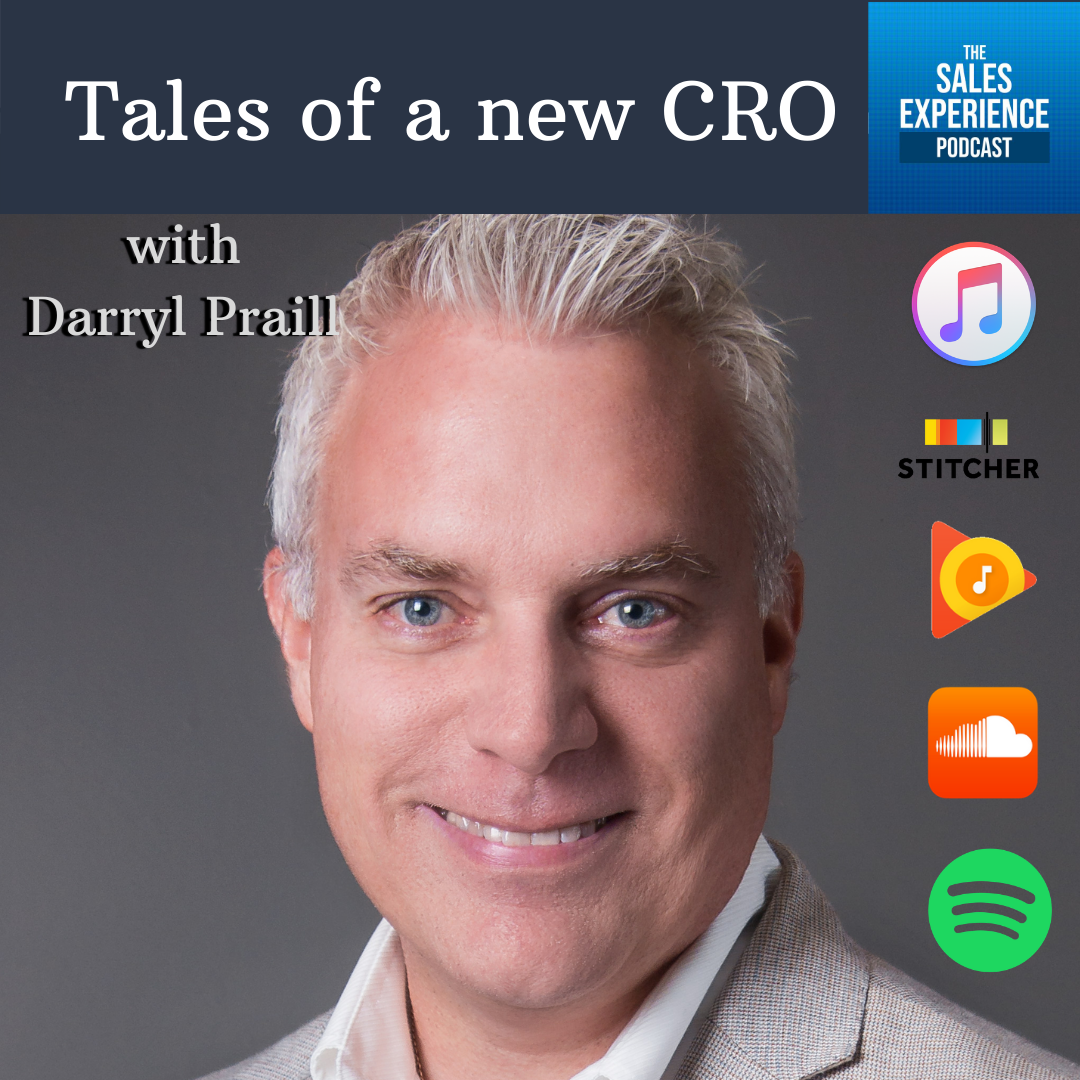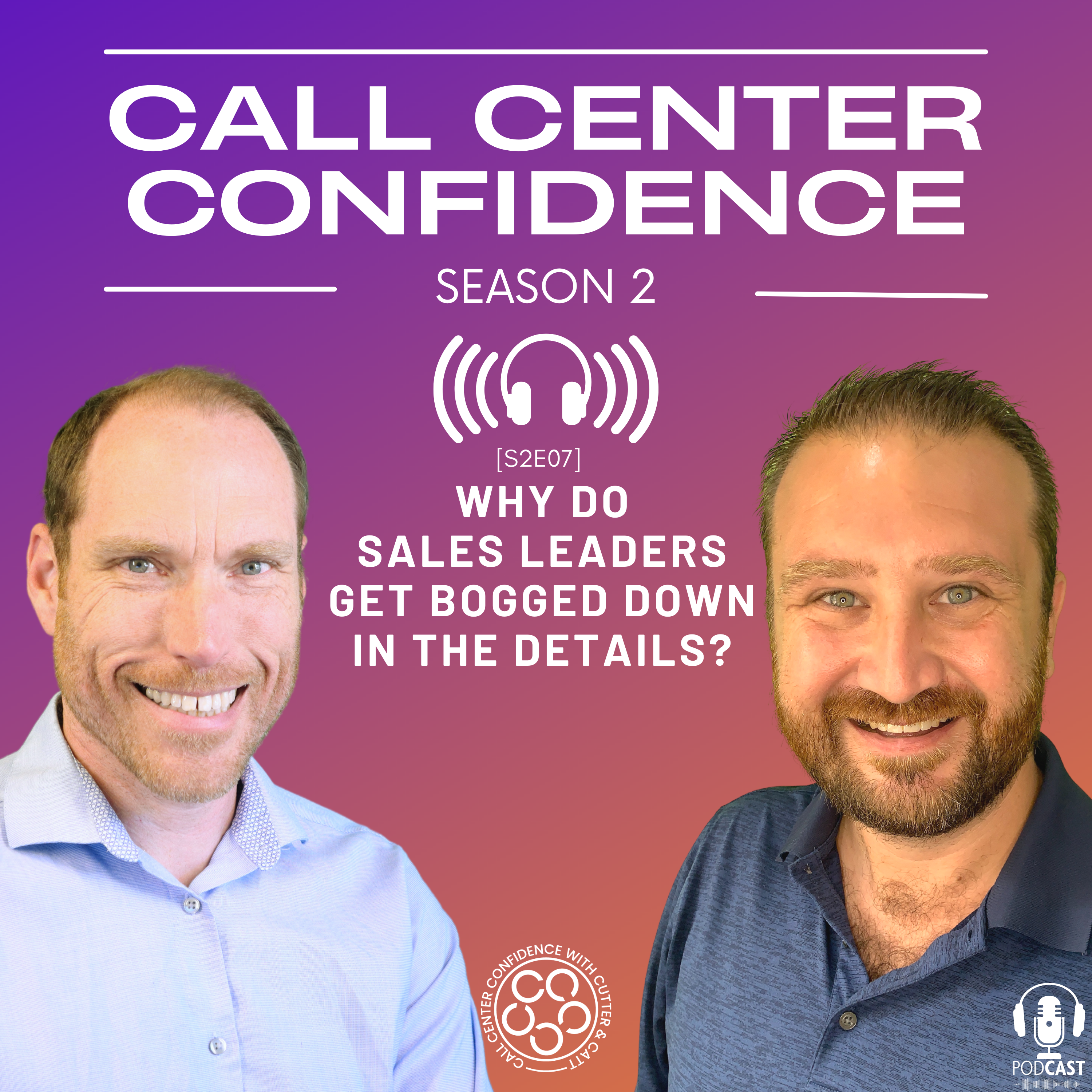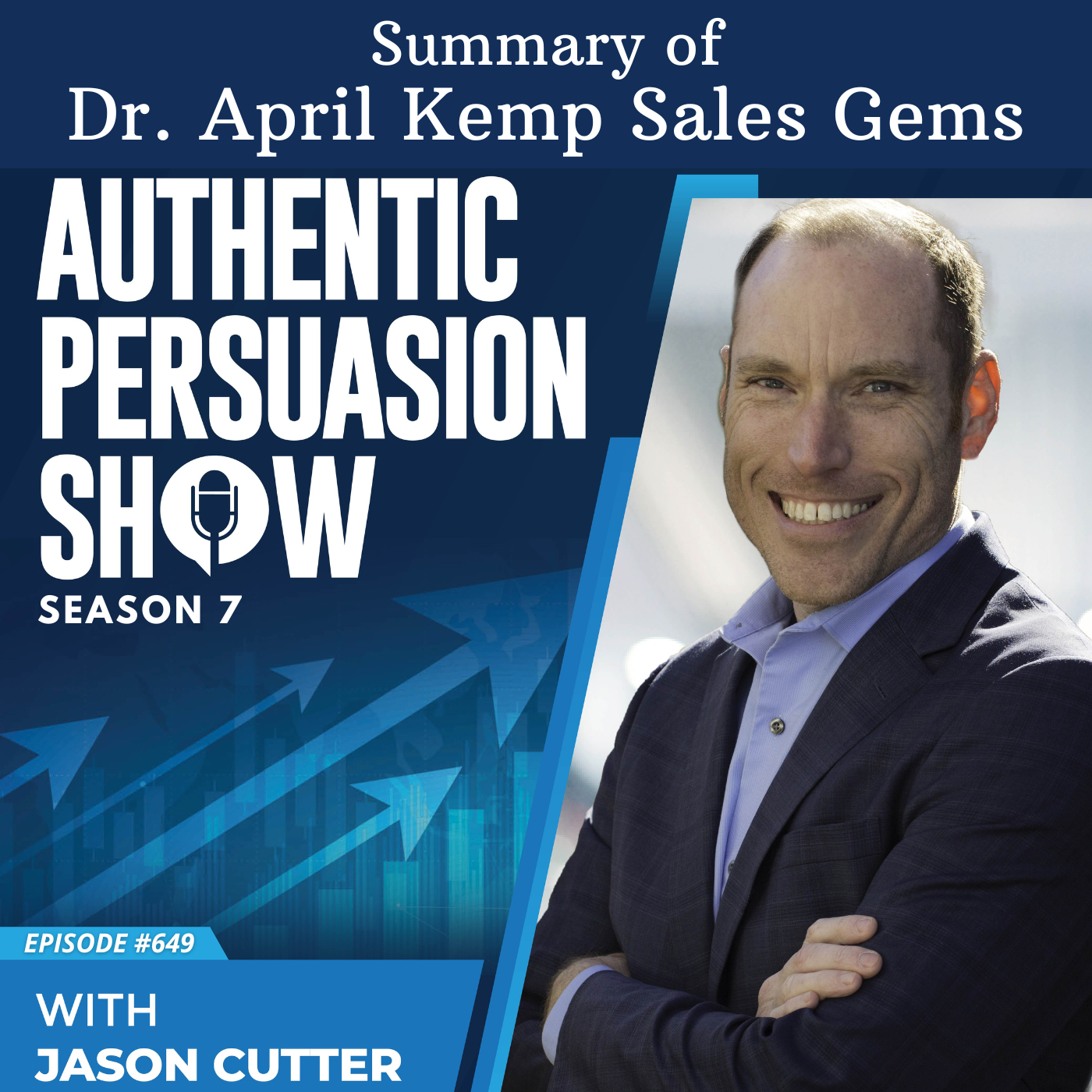Show Notes
On this guest series for the podcast, I have Mark Kosoglow. He is currently at Outreach.Io but for a long time, he has been “Crillin’ It” = Cranking It (Effort) + Killing It (Results).
This is part one of the 4-part mini-series.
In Part 1, Mark and I talk about:
- Sitting through lots of demos to find out what works and what doesn’t
- Not just about asking questions
- How to achieve emotional responses
- Three phases to speaking/presenting
- Listening to understand
- Knowing your stuff
- H2H selling
Download The Power of Authentic Persuasion ebook
Enroll in the Authentic Persuasion Online Course
Connect with Jason on LinkedIn
Connect with Mark on LinkedIn
Mark’s Info:
As a teenager, watching 14 videos in the back storeroom on a 7″ black and white TV to learn how to sell shoes at the mall was a great foundation. Running a small business with 200+ employees taught me how to be organized. Creating a highly profitable sales territory from one dead for a decade was hard work. Managing 12 salespeople across 9 states cemented my sales philosophy.
Building a sales team with, by far, the best, smartest, hardest working people I’ve ever worked with…well, that’s an honor and privilege I get to enjoy every day.
LinkedIn: https://www.linkedin.com/in/mkosoglow/
Twitter: https://twitter.com/GIDselling
Website: http://www.getitdoneselling.com/
Also check out: https://www.outreach.io/
E134 – Transcript
Jason: Welcome to the sales experience podcast. In today’s episode I have Mark Kosoglow. He has a long history of sales leadership, having grown sales territories, managing reps all over the country. He’s been at outreach for over five years and is the VP of sales. And uh, as he puts it, all of his experience and everything up to this point has cemented his sales philosophy. Mark, welcome to the sales experience podcast.
Mark: What up Jason, thanks for having me, man.
Jason: I’m so glad that you’re here. And um, I think it’s fascinating and I love the fact that you also have a podcast which we’ll mention at the end, but the sales engagement podcasts through outreach. And then I have the sales experience podcast and I think there’s a lot of fun stuff we could talk about and you have a ton of experience in B2B with outreach, outbound, inbound, kind of that combination stuff that you’ve written. I figured a good place to start would be a conversation about sales experience. And now this season, kind of like I mentioned to you before we started recording, I have some questions I’m trying to ask guests, so I thought it would be a fun place to start for us. For you, what does a great sales experience look like at your company or what you’ve seen in the past?
Mark: Do you want me to tell you what a great sales experience is that outreach provides or one that me personally as a sales leader likes to go through.
Jason: Let’s start with you as a sales leader and then we can also talk about outreach.
Mark: Yeah, yeah. So I’ve had several goes’s at like really trying to figure out like what is an awesome B2B SAS tech sales experience. I think at one point I did a hundred demos in three months with companies just trying to find that like one demo that was really great. That I, you go from, right? Great. Ours around.
Jason: And so wait, you’re that guy that we’ve all done demos for that doesn’t end up buying, is that you’re saying you’re doing research? We’ve all done that and we’ve all done that on both sides. So…
Mark: I viewed it as I’m providing the value of helping someone practice their [inaudible].
Jason: There you go. Exactly. Perfect.
Mark: But yeah, so it was funny, out of the hundred only really ever had a couple that were really good and meaningful. And I think what I’ve decided it is that when the salesperson has the confidence and it’s just a relaxed enough to actually have a real conversation and let me guide the conversation where I want it to go and it isn’t afraid of where that might end up cause they’re not so desperate to get the sale or something. That’s the experience that draws me in when I feel like I’m in control of the experience. That’s when I feel like the rep is doing a great job of guiding me where it needs to be. Like it’s kind of a little bit contradictory, but, uh, that’s how it works for me. That’s the experience I want.
Jason: And that’s not contradicted, at least how I view it as well. And it’s the one thing whenever I train new salespeople, even salespeople who have tons of experience coming into a new role, one of the biggest challenges is all the things that you have to learn. So whatever the script is, the demo, the process about the product or service that you’re actually selling. And what I tell everybody is the faster you can get to the point where you’re having a conversation and you’re not thinking about what you’re going to say next. And instead, you’re actually asking questions, listening, and then just responding like a normal human in a normal conversation. The faster you can get to that point, the faster you’ll be successful in sales.
Mark: My favorite boss, his name is Matt Nilsson, he taught me, there’s kind of three phases to speaking like public speaking and that could be presenting in a demo. It could be in front of a huge crowd, but phase one is you’re just trying to remember what to say and your brain is so caught up on the, say the right words that you just are missing everything else. The second one is when you are actually knowing a, you actually know what you want to say well enough that you’re paying attention to the audience and you’re trying to like cue off of what’s happening from the audience in a verbal and nonverbal responsive way. And the third level is when you know your stuff so well, you feel like you’re part of the audience and you can respond to and give them what they want, that you’re actually trying to change the emotion and the energy in the room.
Mark: It’s when you’re not a longer okay with just doing a great demo and understanding their questions, but you are trying to figure out along the way how to have this emotive response the entire time throughout that that is leading them down that path to purchasing or path to believe in what you’re talking about or whatever you’re trying to accomplish with the speaking. But those three stages are like how I view salespeople, those rookies, the new hires, they just want to say what is outreach the right way? And they are so caught up in like judging themselves on how well they’re doing it. In that they are just not even paying attention to that. The person is trying to interrupt them with a question. It might be really meaningful to the deal cycle. We have to help reps become comfortable enough that they’re worried about the emotive part of the conversation, not just the back and forth.
Jason: And I think the other part that you said originally about kind of your experiences from getting demos to you and kind of how you’ve built things and look at the sales process is also about how you felt like as the customer, as the prospect, you were more in control of the conversation and driving it and dictating it because it’s really about you, the customer. It’s not necessarily about the sales rep and what they need and if I understand, probably what happened is the salesperson was probably asking questions, letting you talk. You were driving it and then you were speaking more and in my experience, when a prospect or somebody else, even in a relationship could be with a loved one or anybody else is when your talking less and the other person is talking more, they’re going to feel heard, cared about, respected, and then it’s going to be a totally different tone versus the what happens a lot, especially B2B, is the long monologue speaking to speaking at kind of sales process, which is the way it’s generally done, but I don’t think that’s the best way. I’m not a huge fan of it anyway.
Mark: Yeah. Not the hit everybody with the three things, but there’s also these three levels. Right. That you take it from the speakers part, right, which is I’m speaking and I want to be aware of myself in my speaking, but then there’s also the listening part of the equation and how am I evaluating myself as a listener? I’m going to apologize in advance. I can’t remember the third level because the first two are so important. I don’t even know if that third one matters. But the first one is when you have people that are listening to respond and you know you’ve, you’ve probably dealt with this in your interviews and sales calls where people are so intent on saying what they want to say, that you can tell they’re not listening, they’re just ready to jump on whatever little thing that you said that you know gives them a chance to respond.
Mark: The second one is listening to understand. That’s where I think is the sweet spot for sales is like I am listening and thinking at the same time to try to develop a hypothesis around what’s really going on in your head and what you really want based on what I know about what we’re talking about so that we can have like a productive conversation. And I think you know, when you can kind of be aware of you’re speaking in that emotive sense and then be aware of it. You’re listening so that you’re understanding like you, you’ve completed the feedback loop for the person on the other side and your communication is all about them and it’s very little about you. And the magic of that is that’s when you get everything you need, right. To make the deal done or to get what you’re trying to get out of the conversation.
Jason: Yeah. And um, you know, a lot of salespeople that I’ve experienced are, it seemed like they’re afraid of letting the prospect kind of run with the conversation or do a lot of the talking. And I don’t mean the prospect asking questions and being in control and coming up with all kinds of problems. I mean, just talking and sharing. And in my experience, a good salesperson is going to ask questions, create the space where somebody feels comfortable to literally just talk and then run. And if you can get your prospect to talk as much as possible, they will tell you almost everything you need to know to solve their issue. Like you’re saying like how to sell to them and how to help them as that business person, as that business, as that individual, how to sell to them instead of it being about what you think. Yeah,
Mark: I think, you know, there’s an interesting thing and I’m sure that some of these conversational intelligence technology companies can give you a lot of stats on if you listen in the first call, 37% and one person talks 63% you’re 80,000% more likely to close the deal or whatever.
Jason: Yup. That’s the exact stat I believe. I think so,
Mark: Yeah. And to me, I think that, I don’t know if it’s so much about how much you talk and how much you listen as it is, how much do you really understand like what’s going on? And like the thing that we’ve talked about, like who’s in control of that conversation. People feel safe when they’re in control and so a rep feels safe when they’re talking because they control the conversation and like let’s feel a little unsafe in a conversation like Jason, what is the most horrible thing that happens? If you asked me a question that I don’t know the answer to, like I sound like an idiot for five seconds. Then you asked me what’s the worst that can happen if they bring up competitive differentiation that you don’t have an answer for, you just tell them I don’t have an answer but I’ll try to go find one and come back to you. And then you continue the conversation like let the person be in control. Like there’s nothing bad that can happen from that really.
Jason: And I think one of the punchlines for that too that I try to stress to people is just be a human. Like you don’t have to know everything. You don’t have to be the one who has all the answers or the solutions. Just respond how you would normally respond and you know, step back from all that pressure from being a salesperson. Obviously that is your goal. But just like I’ve heard recently, and I haven’t fully embraced it, but there’s B to C, there’s B2 to B and then there’s just H to H human to human, like just have a conversation with another human and then you’ll kind of your direction, your leadership of where you want it to go if it’s a good fit and selling them, but literally just it’s another person.
Mark: Yeah. I think a lot of people would say that’s difficult because in the most of their interactions they’re not trying to get someone to buy something, but I will call the ass on that. I would say when I’m talking to my kids about practice and heart at sports, I’m trying to get them to buy into doing it. If I’m talking to my wife about like what I want for dinner, I’m trying to get her to buy, you know, the steak or whatever it is. Like all of human condition is, is about somebody buying something could be an idea or it could be a product that you know you’re, you’re trying to get somebody to do something otherwise, you know you’re some kind of weird human that is super altruistic and you know, maybe I need to come study with you on a mountain somewhere. I don’t know.
Jason: All right, that’s it for part one of this four-part mini-series of my conversation with Mark. Such a great time and I know from recording this in advance that the whole series is going to be great whether you’re in business to business, business, to consumer sales, but if you’re in B2B sales, this has some gems in it. So make sure to check out all the episodes for this one here. If you want to find the transcript or any of Mark’s links in advance, make sure to go to cutterconsultinggroup.com/podcast find this episode and you’ll find the information there and then make sure you’re subscribed to the show, iTunes, Stitcher, Spotify, SoundCloud, Google play. You can find it all on there. And if you’re not sure where it’s at, always go to the cutterconsultinggroup.com website. You can find all the information, all the links, all the ways to subscribe. I appreciate everyone that’s listening and as always, keep in mind that everything in life is sales and people remember the experience you gave them.
![[E134] Crillin’ It with Mark Kosoglow – Part 1 of 4](https://episodes.castos.com/salesexperiencepodcast/images/Mark-Kosoglow-Cover-Image.png)


